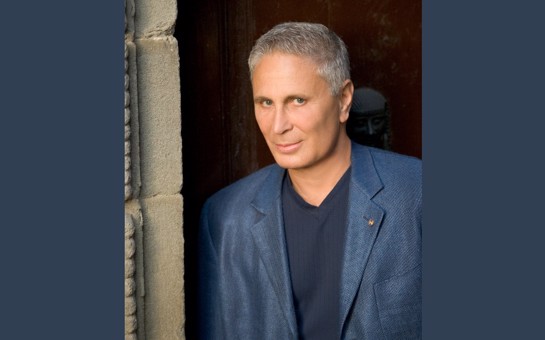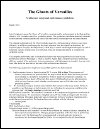- John Corigliano
The Ghosts of Versailles (1991)
- G Schirmer Inc (World)
- 3(2pic).3(ca).3(Ebcl,bcl).3(cbn)/4431/timp.4perc/hp.pf(cel).synth/str (min 14.10.8.8.6 players)
- 2(2pic).2(ca).2(Ebcl,bcl).2(cbn)/2220/timp(perc).3perc/hp,pf(cel).synth/str (6.6.4.4.3 players)
- Cast: principals = 4S, Mz, A, 4T, 2Bar, 2B, associates = 2Mz, Bar(speaking role), B, ensemble = 4S, 2Mz, 2T, 2Bar, B
- 2 hr 50 min
- Libretto by William M. Hoffman suggested by Beaumarchais’ “La Mère coupable.”
- English
- 8th January 2026, Theater, Regensburg, Germany
- 30th January 2026, Theater, Regensburg, Germany
Programme Note
Libretto
William M. Hoffman suggested by Beaumarchais' "La Mère coupable."
About the orchestra and cast
The original production included ensembles onstage:
- players = hpd, man, gtr, hp, vn, va, 3vc, 2db
- rheita band (Act I Scene 5) = ob, 2perc
- ball orchestra (Act II, scene 5) = fl, vn, va, vc
- marchers = 2hn, [opt 2tpt, perc]
In both the full and reduced orchestrations, the parts for these players have now been incorporated into the pit orchestra parts.
Major productions to date, including the premiere, cast more singers than are actually required by the list of major and supporting roles. The opera requires only a minimum of twenty-eight performers to fulfill its casting requirements.
Cast
Principals: 14
soloists playing one role only
FLORESTINE - High Lyric or Coloratura Soprano
MARIE ANTOINETTE - Lyric or Lirico-spinto Soprano
ROSINA - Lyric Soprano
SUSANNA - Mezzo-soprano (or Mezzo-contralto)
ALMAVIVA - Lyric Tenor
LÉON - Lyric Tenor
PATRICK HONORÉ BÉGEARSS - Dramatic Tenor
BEAUMARCHAIS - High Lyric Baritone
FIGARO - Lyric Baritone
LOUIS XVI - Bass
GHOST QUARTET - Soprano, Alto, Tenor, Bass
Associate Principals: 4
soloists playing one main role among other supporting roles
CHERUBINO - High Lyric Mezzo-soprano
also plays
Figaro Pursuer 5/Turkish Embassy Pursuer 6/Revolutionary Woman 5
SAMIRA - Mezzo-soprano
also plays
Figaro Pursuer 6/Revolutionary Woman 6
WILHELM - Baritone and spoken part
also plays
Other Man (Fig. Pursuer 9)/ (T.E. Pursuer 10)/Juror 2/Finale Pursuer 10
SULEYMAN PASHA - Basso Profundo
also plays
Muscovite 3/Juror 4/Prisoner 1/Finale Pursuer 12
Ensemble: 10
soloists playing multiple supporting roles
4 Soprano
2 Mezzo-soprano
2 Tenor
2 Baritone
play
Pursuers of Figaro, Turkish duelists, page, dancing and harem girls,
"rheita" players, acrobats, revolutionary guards, revolutionary women,
courtiers, dancers, prison guards, prisoners, soldiers.
For information about an Opera-in-Concert version of The Ghosts of Versailles with projections by Jerome Sirlin click here
The following vocal selections from The Ghosts of Versailles are available for purchase:
- Aria of the Worm
- As Summer Brings a Wistful Breeze
- Come Now My Darling
- Figaro Was Supposed to Return the Necklace: Beaumarchais' Aria
- Samira's Aria: Cavatina
- They Are Always With Me: Marie Antoinette's Aria
- They Wish They Could Kill Me: Figaro's Aria
- O God of Love (Sextet)
Synopsis
Act I
The ghosts of the court of Louis XVI arrive at the theatre of Versailles. Bored and listless, even the King is uninterested when Beaumarchais arrives and declares his love for the Queen. As Marie Antoinette is too haunted by her execution to reciprocate his love, Beaumarchais announces his intention to change her fate through the plot of his new opera 'A Figaro for Antonia.'
The cast of the opera-within-the-opera is introduced. Following the familiar escapades of the Figaro characters, Almaviva has divorced the Countess after she had a son, Leon, with Cherubino. Leon wants to marry Florestine, Almaviva's illegitimate daughter, but the Count has forbidden the union as retribution for his wife's infidelity and has promised Florestine instead to Bégearss.
Figaro enrages the Count by warning him that his trusted Bégearss is in fact a revolutionary spy. Figaro is fired, but overhears Bégearss and his servant Wilhelm hatching a plot to arrest the Count that evening at the Turkish Embassy when he sells the Queen's necklace to the English Ambassador. Figaro intercepts the plot by infiltrating the party, dressed as a dancing girl. During the outrageous performance of the Turkish singer Samira, Figaro steals the necklace from the Count before the sale can take place, and runs away.
Act II
Figaro returns only to defy Beaumarchais's intention that he return the necklace to the queen, as he wants to sell it to help the Almavivas escape. To put the story back on course, Beaumarchais enters the opera and shocks Figaro into submission by allowing him to witness the unfair trial of Marie.
The Count, swayed by his wife's wishes, rescinds his offer to Bégearss of his daughter's hand. Even though Figaro gives him the necklace, Bégearrs is enraged and sends the Spaniards to the prison where Marie Antoinette lingers.
Beaumarchais and Figaro, the only two to escape, arrive at the prison to try to rescue the Almavivas. They are shortly followed by Bérgeass whom Figaro denounces to the revolutionaries, revealing that he has kept the necklace rather than using it to feed the poor. Bégearss is carried off, the Almavivas escape to America and Beaumarchais is left with the keys to the Queen's cell. But the power of his love has made the Queen accept her fate and she refuses to let Beaumarchais alter the course of history. Marie is executed, and the pair is united in Paradise.
Composer Note
For many years after the glorious premiere of The Ghosts of Versailles, I have always felt that my opera was haunted by its spectacular production. People associated it with Prokofiev’s War and Peace — a work that could not exist without the grandest and most expensive mounting. So, like War and Peace, most opera houses thought The Ghosts of Versailles almost impossible to produce.
My collaborator, William Hoffman, and I always felt that the opera would benefit from being seen through a closer lens. A more economical production and casting scheme would focus the audience on the true nature of the work: that is, that while The Ghosts is, in part, an entertaining buffa, it is also a serious meditation on history and change: specifically, on how change comes about both in politics and in art. Mid-century modernists at their most fundamentalist demanded that we destroy, not merely rethink, the past to forge a new future: a demand of which the guillotine makes a terrible and perfect symbol. But our view of art was that change could come by embracing the past (the opposed worlds of the commoner Beaumarchais and the regal Marie Antoinette) and moving into the future (as did that couple, finally united, in our opera.)
The terrible World Wars that fired the angst and destruction that obsessed the Modernists have been replaced by a more evolutionary view of change. Leningrad has become St. Petersburg again without a shot being fired. Musicians and artists in the 21st century are no longer chained to the severe and limited point of view of the 20th century, despite the antique views of some living musicians and artists of the past.
Perhaps this message will be clearer in this new version. The Met’s introduction of The Ghosts of Versailles was one of the high points of my artistic life. Still, this smaller, focused production may demonstrate — as well as its practicality — more of what the work itself has to say. I can hardly wait.
— John Corigliano
May, 2009
Media
Scores
Features

- Opera Season Highlights 2025-26
- Discover operatic highlights from Wise Music Classical during the 2025-26 season test

- Operas in Concert: Art’s Afterlives
- Discover operatic works that shine in concert performance from Wise Music Classical.
Reviews
Discography
More Info

- John Corigliano at Theater Regensburg with ‘The Ghosts of Versailles’ and ‘STOMP’
- 22nd September 2025
- In September and October, Theater Regensburg presents two works by John Corigliano – his landmark opera The Ghosts of Versailles and STOMP (for orchestra) – with Philharmonisches Orchester Regensburg and chief conductor Stefan Veselka.

 Located in the UK
Located in the UK
 Located in the USA
Located in the USA
 Located in Europe
Located in Europe

